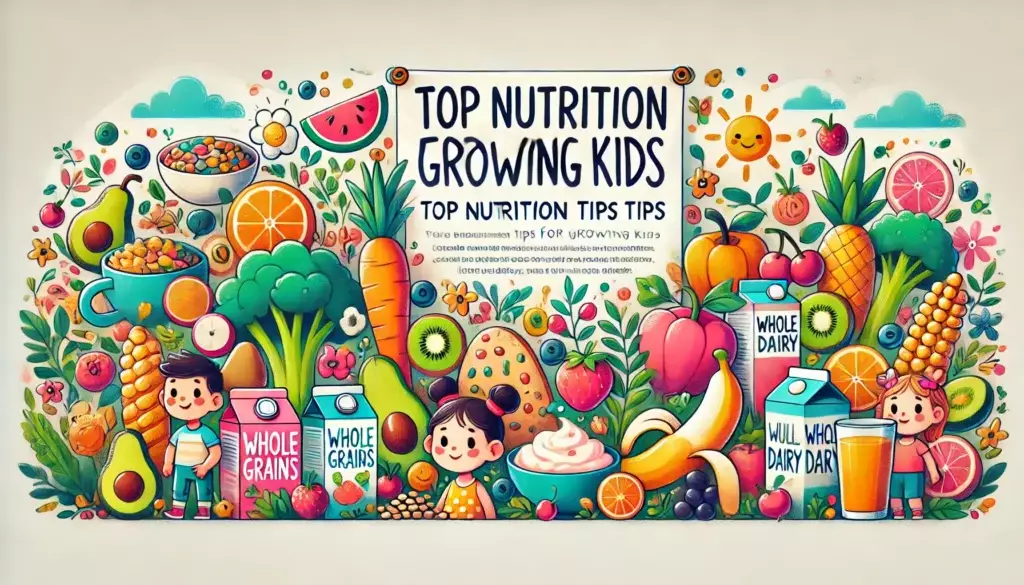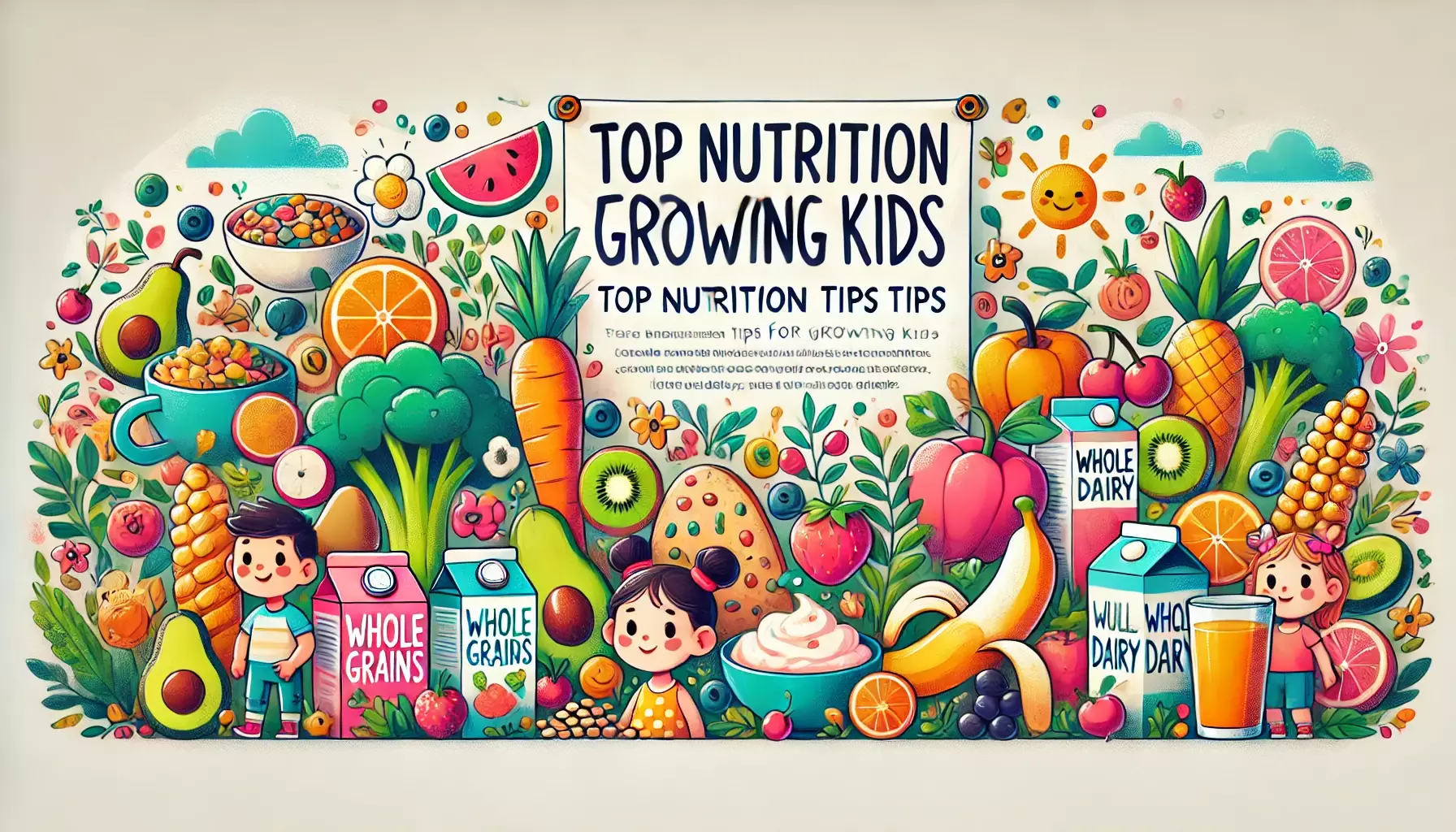Top Advice for Kids’ Nutrition
Encouragement of healthy growth, cognitive development, and immune resilience depends on your child’s nutritional needs being met. This article explores tested dietary plans that not only offer vital vitamins and minerals but also create lifetime healthy habits to assist parents in negotiating this road map.
The Value of a Well-balanced Diet for Growing Children
Children grow fast both physically and mentally, and nutrition is absolutely vital. A good diet lays the basis for best health by supporting energy levels, immunity, and muscular and bone strength. A well-rounded diet results from including micronutrients (vitamins and minerals) and macronutrients (carbohydrates, proteins, and fats).
Essential Nutrients for Childhood Development and Growth
1. Protein for Development of Muscle and Tissue
Muscle development, tissue repair, and enzyme action all depend on protein. Lean meats, eggs, dairy products, beans, lentils, nuts, seeds, and other sources of premium protein should be mainstays of your child’s diet.
Try to have protein in every meal. Snacks can provide a protein boost; options include yogurt with fruit, peanut butter on whole-grain toast, or a slice of cheese.
2. Carbohydrates: gasoline for developing bodies
Children’s main energy source is carbohydrates, which also drive everyday activities and support brain function. Choose complex carbohydrates—whole grains, fruits, veggies, legumes—that deliver consistent energy and steer clear of sugar crashes linked with processed carbohydrates.
Excellent carbohydrate sources with fiber and micronutrients are whole-grain pasta, oatmeal, brown rice, and fruits like apples and bananas.
3. Good fats for development of the brain and nerve system
For brain growth, hormone generation, and the absorption of fat-soluble vitamins (A, D, E, and K), healthy fats are absolutely vital. Particularly omega-3 fatty acids help cognitive ability and are crucial throughout periods of growth.
Suggest to your child foods high in unsaturated fats, including avocados, nuts, seeds, and fatty fish (such as salmon and sardines).

Basic Minerals and Vitamins for Growing Children
4. Vitamin D and calcium for strength of the bones
Calcium helps build bones; when combined with vitamin D, it becomes much more potent. Beneficial foods heavy in calcium are dairy, leafy greens, tofu, and fortified plant milk. Since sunlight is the natural source of vitamin D, augmenting with foods like egg yolks and fortified cereals can also aid.
Tip: A daily intake of dairy or fortified plant-based milk can help children achieve their calcium needs and support bone health.
5. Iron for cognitive ability and energy
Essential for energy levels and cognitive ability as well as for supplying oxygen to tissues and cells, iron is Great iron sources are red meat, chicken, shellfish, beans, and leafy greens. Combining foods high in iron with Vitamin C sources like citrus fruits helps absorption.
To enhance iron absorption, present dishes including iron and vitamin C beside each other, like a spinach salad with orange slices.
6. Fiber for Gastric Health
Fiber keeps constipation free and facilitates digestion. Natural sources of dietary fiber that maintain children’s digestive tracts in good shape and support a balanced microbiome are fruits, vegetables, whole grains, and legumes.
To increase fiber intake, serve fruits with the skin on—apples and pears—along with whole-grain breads and cereals.
Useful Advice for Fussy Foodies
7. Appealing Fruits and Vegetables
Children can be picky about fruits and veggies; hence, it’s good to have a range and present them imaginatively. Children who participate in grocery shopping or meal cooking may be more likely to sample unusual meals.
To boost acceptability, make creative fruit skewers or combine chopped vegetables into preferred dishes like smoothies or spaghetti sauces.
8. Sustained Energy from Balanced Snacks
Not only should snacks fulfill hunger, but they also add to general nutrition. For steady energy, consider foods including protein, good fats, and carbohydrates rather than highly processed snacks.
Balanced nutrition can come from apple slices with almond butter, Greek yogurt with berries, or a whole-grain muffin with a glass of milk.
9. Water is Crucially Important Promoting Water above Sugary Drinks
Though it is sometimes disregarded, hydration is absolutely vital for general health. Promote water as the main beverage to cut back on sugary drinks that add empty calories and might cause tooth problems.
Tip: To make naturally appealing without additional sugars, flavor water with slices of citrus or berries.
Good Eating Practices All Your Life
10. Get Children Helping in the Kitchen
Children’s enthusiasm for good eating rises when they help with meal planning and cooking. Giving kids fundamental cooking knowledge helps them to choose their diet better as they develop.
Start with easy dishes like sandwiches or smoothies and progressively let them assist with more difficult chores as they grow at ease in the kitchen.
11. Provide a positive model.
Young children copy the actions of their surroundings. Show kids the value of a balanced diet by eating a range of meals; avoid labeling things as “good” or “bad,” instead emphasize balance and moderation.
12. Have Meals With Others
Family dinners help to establish good relationships with food and encourage thoughtful eating practices. Shared meals present an opportunity to highlight the need for a balanced diet and introduce novel items.
Aim for at least one meal every day where everyone may enjoy wholesome meals in a laid-back environment.
Nutritional Advice and Guidelines for Various Age Groups
Children & Toddlers (0–2 Years)
Breast milk or formula gives main nutrients during this stage, then progressively moving to solid meals. Including fruits, veggies, and grains exposes young children to a range of tastes and sensations.
Early Childhood, Two to Five Years
Foods high in nutrients become absolutely vital in these years of fast development. Essential are calcium and protein; emphasis should be on developing good eating habits and exposure to a range of foods.
School-Age Children (6–12 Years)
Balanced nutrition improves learning as well as physical activity during the school years. Provide a variety of foods to avoid nutrient deficits and encourage steady energy all day long.
Teenagers (13–18 years)
Teenagers go through major changes that increase their demand for calories, protein, and certain minerals as iron and calcium. Stress foods high in nutrients and teach teenagers about the long-term advantages of a healthy diet.
How to Handle Typical Dietary Issues in Young Children Handling Food Allergies
Children with food sensitivities need appropriate substitutes. Work collaboratively with medical professionals to create a balanced, allergen-free diet fit for your nutritional requirements.
Monitoring Sugar Consumption
Unchecked sugar can cause health issues, including tooth decay and obesity. To cut additional sugars, especially in processed snacks, support whole foods and study food labels.
Making sure a vegetarian or vegan diet has enough nutrients
When properly controlled, vegetarian and vegan diets can help with good growth. Through plant-based options and fortified foods, guarantee enough quantities of protein, iron, calcium, and vitamin B12.
Establishing a Nutritional Basis for Continuum of Life
Early life optimal nutrition prepares the ground for long-term health. Parents who know and apply these techniques can help their child’s general development and growth, satisfy dietary demands, and promote good eating habits. Encouragement of a lifetime of wellness comes from giving balanced meals top priority, including children in food decisions, and establishing a pleasant food environment.
Often asked questions include:
1. Which vital nutrients support children’s development?
Children need proteins, carbs, good fats, vitamins (including Vitamin D, Vitamin C, and B vitamins), and minerals including calcium and iron. These nutrients assist general immunological health, cognitive development, bone strength, and muscle growth.
2. A growing youngster needs what level of protein?
Though children’s needs vary based on their age and degree of exercise, generally they require about 10-20 grams every meal. Kids may get great protein from foods such as lean meats, eggs, dairy, beans, and nuts.
3. Why are children’s fruits and veggies so vital?
Supporting digestion, immunity, and energy levels, fruits and vegetables offer vital vitamins, fiber, and antioxidants. Including a range of vibrant vegetables guarantees children receive a whole spectrum of nutrients.
4. How might I inspire my youngster to consume more veggies?
Involve children in meal prep, show vegetables in creative forms or vibrant combinations, and integrate vegetables into preferred dishes like smoothies or noodles to inspire vegetable intake.
5. Which kid-friendly snacks are healthiest?
Healthy snacks range from fruit with yogurt to vegetable sticks topped with hummus to whole-grain crackers topped with cheese to a handful of nuts. These snacks give steady energy, free of additional sweets.
6. Daily water intake for my child should be what?
Children’s daily water needs vary depending on their age and degree of exercise, between 5 and 8 cups. Encouragement of water as the primary beverage supports hydration and general health, particularly in relation to sweet drinks.
7. Are there particular foods children should not eat for their health?
Yes, cut foods heavy in artificial additives, saturated fats, and added sugars. Steer clear of excessively processed snacks and sweet beverages. Choose instead whole meals that boost and sustain you.
8. Where could children find adequate sources of calcium?
Along with fortified plant-based milks, leafy greens, and tofu, good sources of calcium are dairy products, including milk and yogurt. Calcium helps kids’ bones grow and be strong.



